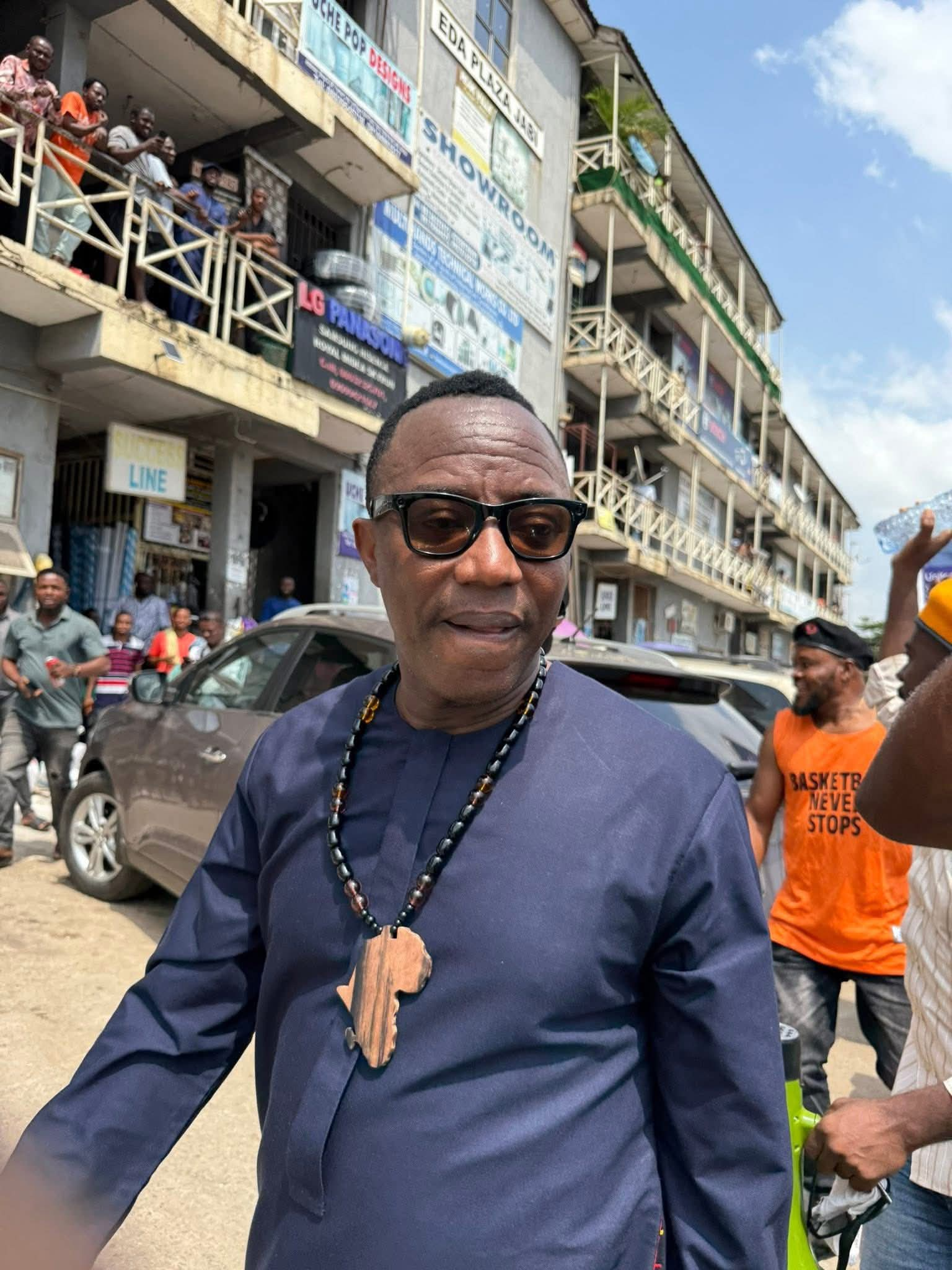
Sowore Turns Usain Bolt as Police Fire Tear Gas and Gunshots at Nnamdi Kanu Protest—But He’s Back on the Streets Again

It was a scene of chaos, confusion, and unexpected comedy on Monday morning in Abuja as well-known Nigerian activist and former presidential candidate, Omoyele Sowore, showcased an Olympic-worthy performance when police fired tear gas and gunshots into the air during a protest demanding the release of detained IPOB leader, Nnamdi Kanu. What started as a peaceful march quickly turned into a dramatic spectacle when the sound of gunfire sent protesters scattering in every direction—none faster than Sowore himself, who appeared to have instantly activated his “Usain Bolt” mode.
Eyewitnesses at the scene said the activist, known for his fiery courage and resilience in the face of government oppression, took off at a lightning pace once the first tear gas canister hit the air. “I’ve never seen Sowore run like that in my life,” one protester joked. “He didn’t even look back! If there was a race, he would have won gold. Even his shadow couldn’t keep up!”
The protest, which began earlier in the morning at the Unity Fountain in Abuja, was organized by pro-Biafra supporters and human rights activists who have continued to demand the unconditional release of Nnamdi Kanu, leader of the Indigenous People of Biafra (IPOB). The crowd had gathered peacefully, chanting solidarity songs and displaying placards calling for justice, self-determination, and an end to Kanu’s prolonged detention.
However, the atmosphere shifted quickly when armed policemen arrived at the scene, forming a barricade to prevent the protesters from marching toward key government buildings. Tensions escalated as the police repeatedly warned the crowd to disperse, but the protesters refused to back down, insisting on their constitutional right to peaceful assembly. Moments later, the police fired tear gas to disperse the demonstrators, and that was when the chaos began.
Videos circulating on social media captured the dramatic moment Sowore sprinted away from the smoke, leaving behind a cloud of dust and laughter among bystanders. Some users on X (formerly Twitter) wasted no time in creating memes comparing him to world champion sprinter Usain Bolt. “Sowore broke the 100m world record today in Abuja!” one user joked, while another wrote, “When police fire tear gas, even activists remember their speed from secondary school.”
Despite the brief moment of comic relief, the situation on ground was far from humorous. Several protesters reportedly sustained injuries while trying to escape the chaos, and a few were seen coughing and gasping for breath due to the tear gas. Eyewitnesses claimed that at least one person fainted during the stampede, though no fatalities were confirmed as at press time. The police, on their part, maintained that the action was necessary to prevent the protest from degenerating into violence, insisting that they had acted “within the bounds of the law.”
Interestingly, just hours after his now-viral “escape sprint,” Sowore was seen again at the protest ground, proving that while his legs may have run for safety, his spirit remained unbroken. Videos later showed him addressing a smaller group of protesters, his voice hoarse but defiant, declaring that “no amount of intimidation or tear gas can silence the people’s demand for freedom and justice.”
In his words, “We ran not because we are afraid, but because we want to live to fight another day. They can fire all the tear gas they want; we will still come out tomorrow. You can’t tear gas the truth. You can’t shoot down justice.” His return drew applause from supporters who hailed his resilience and sense of humor in the face of intimidation.
Sowore’s participation in the #FreeNnamdiKanu protest comes as no surprise to many. The Sahara Reporters publisher and convener of the #RevolutionNow movement has long been a vocal critic of what he calls Nigeria’s “culture of oppression.” He has himself been arrested multiple times for organizing protests against bad governance and corruption. His latest show of solidarity with the pro-Biafra movement has reignited debates about free speech, civil rights, and government accountability in Nigeria.
Observers say the repeated clashes between law enforcement agencies and peaceful protesters expose the government’s intolerance for dissenting voices. Human rights groups have condemned the police’s use of force, describing it as a violation of citizens’ rights to peaceful assembly. Amnesty International and other organizations have previously criticized similar crackdowns, warning that the government’s heavy-handed tactics only deepen public resentment.
The Nnamdi Kanu case continues to draw national and international attention. Kanu, who has been detained by the Department of State Services (DSS) since 2021, faces charges related to treason and terrorism—accusations he has consistently denied. His supporters argue that he is being persecuted for advocating for the rights of the Igbo people and calling for a referendum on Biafra. The Federal Government, however, insists that his actions endangered national unity and security.
The ongoing protests calling for his release have taken place in several parts of Nigeria, with Abuja being the latest hotspot. Each demonstration seems to follow a similar pattern: a peaceful gathering, followed by confrontation with security forces, and then a wave of arrests or dispersal. Yet the movement remains unshaken, driven by what activists describe as “a hunger for justice that cannot be silenced by force.”
Meanwhile, social media platforms have been buzzing with reactions to Sowore’s sprint, with many Nigerians expressing a mix of amusement and admiration. “Say what you like about Sowore, but that man is fearless,” one user commented. “Even when he runs, he comes back stronger.” Another quipped, “Nigeria’s police have turned protests into the new Olympics. Every activist must train for the 100-meter dash.”
As of this evening, Sowore is reportedly back on the protest ground, standing shoulder to shoulder with the remaining demonstrators, chanting “Free Nnamdi Kanu now!” His return has been seen as a powerful statement that while he may have run from danger, he did not run from the cause. The activist, it seems, has once again proven that courage is not the absence of fear but the persistence to stand tall after every fall—or in this case, every sprint.
In a country where citizens have grown used to seeing protests violently suppressed, Sowore’s dramatic escape and determined return offer a rare glimpse of humor and hope in the struggle for justice. His swift feet may have stolen the spotlight for a moment, but it is his unyielding voice that continues to echo through the streets of Abuja—reminding the world that the fight for freedom in Nigeria is far from over.
And while Nigerians continue to share memes of the “Sowore sprint” online, one thing remains clear: the activist’s resilience is no laughing matter. Whether running from tear gas or marching toward justice, Sowore remains one of the most unrelenting figures in Nigeria’s fight for democracy—proving once again that no amount of bullets or tear gas can silence a man whose spirit refuses to stay down.


